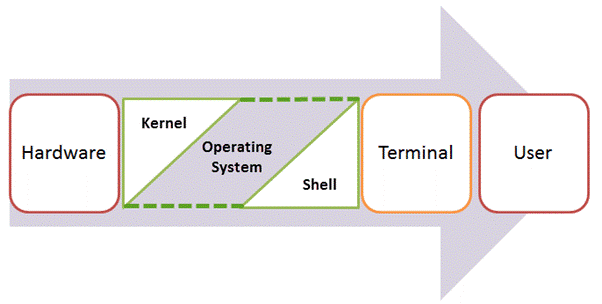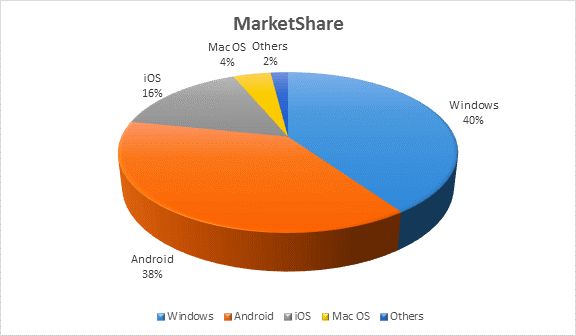OPERATING SYSTEM
Submitted By Soumita Kumar
(Department of BCA, Batch: 2017-2020)
University Roll No :15201217024
Definition of Operating System:-
- An Operating System is an essential component of a computer system. It is a large set of large and complex program that acts as an interface between the computer hardware & its user. Its serves twin objectives, interpreting the user program instructions to the hardware as well as providing coordination services necessary to enable a group of users to share computer system resources efficiently.
History Of OS:-
- Operating systems were first developed in the late 1950s to manage tape storage
- The General Motors Research Lab implemented the first OS in the early 1950s for their IBM 701
- In the mid-1960s, operating systems started to use disks
- In the late 1960s, the first version of the Unix OS was developed
- The first OS built by Microsoft was DOS. It was built in 1981 by purchasing the 86-DOS software from a Seattle company
- The present-day popular OS Windows first came to existence in 1985 when a GUI was created and paired with MS-DOS.
Need of Operating System:-
- In earlier day’s user had to design the application according to the internal structure of the hardware. Operating System was needed to enable the user to design the application without concerning the details of the computer’s internal structure. In general the boundary between the hardware & software is transparent to the user.
Features of Operating System:-
Here is a list commonly found important features of an Operating System:-
- Protected and supervisor mode
- Allows disk access and file systems Device drivers Networking Security
- Program Execution
- Memory management Virtual Memory Multitasking
- Handling I/O operations
- Manipulation of the file system
- Error Detection and handling
- Information and Resource Protection
- Resource allocation
What is a Kernel:-
- The kernel is the central component of a computer operating systems. The only job performed by the kernel is to the manage the communication between the software and the hardware. A Kernel is at the nucleus of a computer. It makes the communication between the hardware and software possible. While the Kernel is the innermost part of an operating system, a shell is the outermost one.

Types of Operating system:-
- Batch Operating System
- Multitasking/Time Sharing OS
- Multiprocessing OS
- Real Time OS
- Distributed OS
- Network OS
- Mobile OS
Batch Operating System:
- Some computer processes are very lengthy and time-consuming. To speed the same process, a job with a similar type of needs are batched together and run as a group.
- The user of a batch operating system never directly interacts with the computer. In this type of OS, every user prepares his or her job on an offline device like a punch card and submit it to the computer operator.
Multi-Tasking/Time-sharing Operating systems:
- Time-sharing operating system enables people located at a different terminal (shell) to use a single computer system at the same time. The processor time (CPU) which is shared among multiple users is termed as time sharing.
Real time OS:
Ø A real time operating system time interval to process and respond to inputs is very small. Examples: Military Software Systems, Space Software Systems.
Distributed Operating System:
- Distributed systems use many processors located in different machines to provide very fast computation to its users.
Network Operating System:
- Network Operating System runs on a server. It provides the capability to serve to manage data, user, groups, security, application, and other networking functions.
Mobile OS:
- Mobile operating systems are those OS which is especially that are designed to power smart phones, tablets, and wearable devices. Some most famous mobile operating systems are Android and iOS, but others include BlackBerry, Web, and watch OS.
Difference between 32-Bit vs. 64 Bit Operating System:-
|
Parameters |
32. Bit |
64. Bit |
|
Architecture and Software |
Allow 32 bit of data processing simultaneously |
Allow 64 bit of data processing simultaneously |
|
Compatibility |
32-bit applications require 32-bit OS and CPUs. |
64-bit applications require a 64-bit OS and CPU. |
|
Systems Available |
All versions of Windows 8, Windows 7, Windows Vista, and Windows XP, Linux, etc. |
Windows XP Professional, Vista, 7, Mac OS X and Linux. |
The advantage of using Operating System:-
- Allows you to hide details of hardware by creating an abstraction
- Easy to use with a GUI
- Offers an environment in which a user may execute programs/applications
- The operating system must make sure that the computer system convenient to use
- Operating System acts as an intermediary among applications and the hardware components
- It provides the computer system resources with easy to use format
- Acts as an intermediator between all hardware's and software's of the system
Disadvantages of using Operating System:-
- If any issue occurs in OS, you may lose all the contents which have been stored in your system
- Operating system's software is quite expensive for small size organization which adds burden on them. Example Windows
- It is never entirely secure as a threat can occur at any time
Examples of Operating System with Market Share

Summary:-
- An operating system is a software which acts as an interface between the end user and computer hardware
- Operating systems were first developed in the late 1950s to manage tape storage
- The kernel is the central component of a computer operating systems. The only job performed by the kernel is to the manage the communication between the software and the hardware
- Two most popular kernels are Monolithic and Micro Kernels
- Process, Device, File, I/O, Secondary-Storage, Memory management are various functions of an Operating System
- Batch, Multitasking/Time Sharing, Multiprocessing, Real Time, Distributed, Network, Mobile are various types of Operating Systems.
Bibliography:-
1. Operating System Principles by Silberschatz, Galvin, Gagne
2. Operating Systems by J. Archer Harris, Jyoti Singh
- Advanced Operating System by Suvarna Jagtap
- siliconindia.com
- wikipedia.com
- indefiniteloop.com
